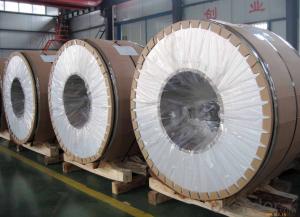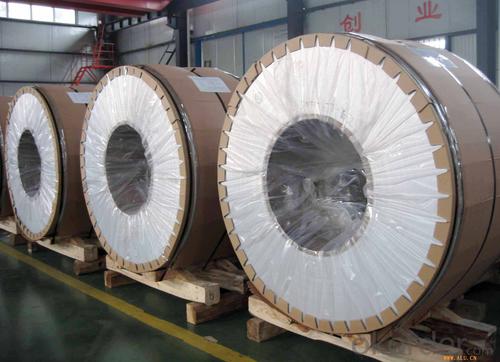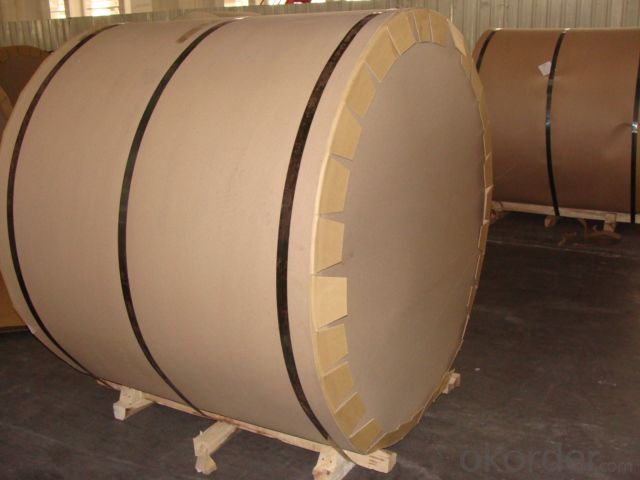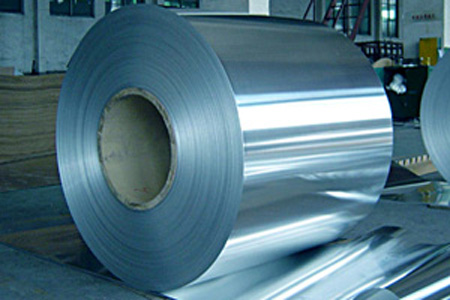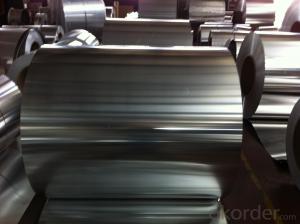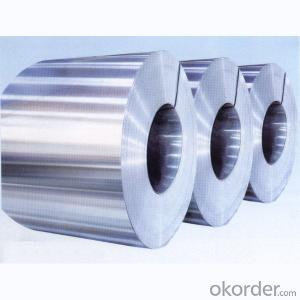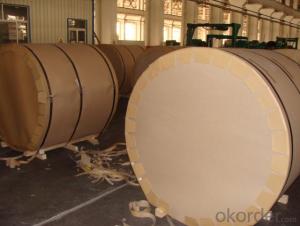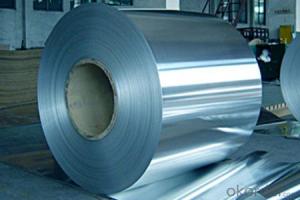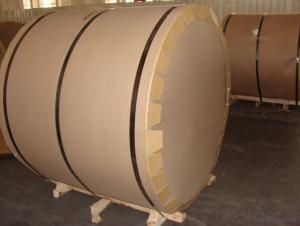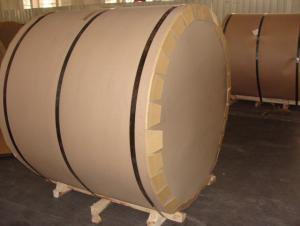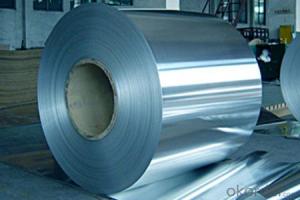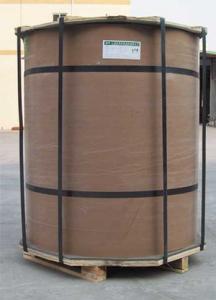Aluminum Coils Inc Ohio AA5XXX Mill-Finished Hot Rolled Aluminum Coils for Construction
- Loading Port:
- Shanghai
- Payment Terms:
- TT or LC
- Min Order Qty:
- 8 m.t.
- Supply Capability:
- 10000 m.t./month
OKorder Service Pledge
OKorder Financial Service
You Might Also Like
Specification
1.Structure of AA5xxx Mill-Finished Hot Rolled Aluminum Coils Used for Construction Description
AA5xxx Mill-Finished Hot Rolled Aluminum Coils Used for Construction has great ductility, heat conductivity, anti-corrosion and moisture resistance properties.
AA5xxx Mill-Finished Hot Rolled Aluminum Coils Used for Construction is widely used for electronics, instruments, lighting decoration, packing industry, house decoration, curtain wall, honeycomb-core panel, sandwich panel, aluminum composite panel and aluminum composite pipes.
2.Main Features of AA5xxx Mill-Finished Hot Rolled Aluminum Coils Used for Construction
a.excellent quality,good credit;competitive price,comfortable service;Samples for free
b.fast delivery,small order accepted;Good rust resistance
c.We can control the delivery time within 35 days.
3.AA5xxx Mill-Finished Hot Rolled Aluminum Coils Used for Construction Images
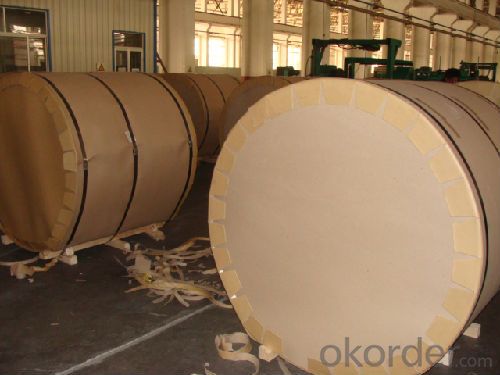
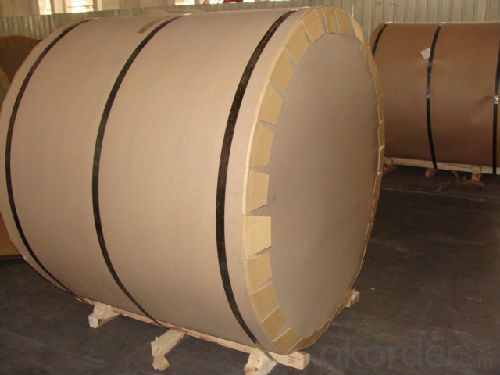
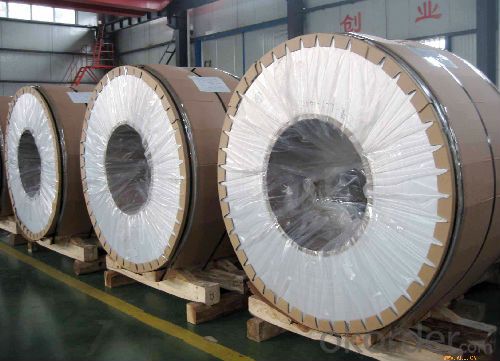
4.AA5xxx Mill-Finished Hot Rolled Aluminum Coils Used for Construction Specification
| Alloy | AA5xxx (AA5052,AA5083,AA5754 etc.) |
| Temper | H14,H16,H18,H22,H24,H26,H32,O/F |
| Thickness | 0.2mm--100mm |
| Width | 30mm--1700mm |
| Standard | GB/T 3880-2006 |
5. FAQ of AA5xxx Mill-Finished Hot Rolled Aluminum Coils Used for Construction
What is the quality standard?
---Usually our standard is GB3880-2006
What is the largest width?
---It is 2300mm
What is the MOQ?
---Usually we can accept 80 tons.
- Q: What is the creep resistance of aluminum coils?
- The creep resistance of aluminum coils is generally high, as aluminum has a low melting point and exhibits minimal creep deformation under normal operating conditions.
- Q: What are the transportation and storage requirements for aluminum coils?
- There are several factors that determine the transportation and storage requirements for aluminum coils. Firstly, it is crucial to handle the coils with caution during transportation in order to avoid any harm. Secure packaging is necessary to prevent potential scratches, dents, or deformation. Additionally, safeguarding the coils from moisture is essential as exposure to water or high levels of humidity can result in corrosion. During transportation, it is advisable to employ appropriate vehicles or containers that can sufficiently support the weight and dimensions of the aluminum coils. The coils should be firmly secured to prevent any movement or shifting that may cause damage. Regarding storage, it is of utmost importance to store aluminum coils in an area that is clean, dry, and well-ventilated. Ideally, the storage facility should maintain a stable temperature and humidity level to prevent any negative effects on the coils. If the coils are stored outside, they should be adequately covered and protected from direct sunlight, rain, and other weather conditions. Furthermore, it is crucial to store aluminum coils away from any substances or chemicals that may cause damage. They should be stored in a manner that prevents contact with other materials, as physical contact can lead to scratching or other types of damage. In summary, the transportation and storage requirements for aluminum coils involve careful handling, protection from moisture and corrosive materials, proper packaging and securing during transportation, and storage in a clean and suitable environment. By adhering to these guidelines, the integrity of the aluminum coils can be preserved, ensuring their quality and usability.
- Q: hello I'm building a TIG welder and have found the output from my stick welders to be not so good for aluminum(60 Hz on one). I've heard that high frequency AC is the way to do AL but am not sure what constitutes high. I do have a nice miller gas driven welder also that is maybe triple the frequency of my line driven one but still had issues with it. does anyone know of an actual # ? I may be able to build an inverting PWM supply eventually to do this but am not sure what I would need it to do. does anyone have any data that might help? any data/tips about aluminum would be appreciated, thanks in advance. FYI I do understand why AC works so much better on AL, what with the oxides that are always present.
- The High Frequency used in aluminum is for the starting and stabilizing of the ac wave. All the h/f will do is allow you to start the arc without touching the tungsten to the work and stabilize the arc itself. The h/f does not pertain to the alternating current frequency (50 - 60 Hz). The ac current does the cleaning of the aluminum to some degree (not eliminating proper prep and cleaning before weld). You could buy a high freq add on unit that could help, check with your local welding supplier or look it up on line. Edit -- Here's a thought go to some of the welding power supply websites and find a manual on a tig machine and see if they have a schematic on the high freq. hidden within the service manual. You could then get an idea of how they did it.
- Q: What are aluminum coils used for?
- Aluminum coils are commonly used in various industries, such as construction, automotive, and HVAC, for their excellent thermal conductivity and corrosion resistance properties. They are primarily used for manufacturing heat exchangers, air conditioning systems, refrigeration units, and other heat transfer applications.
- Q: Are aluminum coils suitable for insulation jacketing?
- Yes, aluminum coils are suitable for insulation jacketing. Aluminum is a highly durable and corrosion-resistant material that can effectively protect insulation materials from external elements. Additionally, aluminum coils offer excellent heat and moisture resistance, making them an ideal choice for insulation jacketing applications.
- Q: Hi, I have a large bag of aluminium sulfate that I would like to use to turn my hydrangeas blue but there are no instructions on the pack, can anyone tell me how much I need (mixed with water)
- I usually sprinkle about 1/4 cup around the base of the plant and water it in. This must be done before flowers appear.
- Q: What are the different types of aluminum alloy used in coil production?
- There are several different types of aluminum alloy used in coil production, each with its own unique properties and characteristics. Some of the most commonly used aluminum alloys in coil production include: 1. 1100 Aluminum Alloy: This type of alloy is known for its excellent corrosion resistance and high thermal and electrical conductivity. It is often used in applications where strength is not a primary concern, such as in food and beverage packaging. 2. 3003 Aluminum Alloy: This alloy is commonly used in coil production due to its moderate strength and good formability. It is often used in roofing and siding applications, as well as in the manufacture of HVAC components. 3. 5052 Aluminum Alloy: This alloy is known for its high strength and excellent corrosion resistance, making it ideal for use in marine and automotive applications. It also has good formability and is often used in the production of fuel tanks and body panels. 4. 6061 Aluminum Alloy: This alloy is a versatile and widely used aluminum alloy that offers a good balance of strength, formability, and corrosion resistance. It is commonly used in a variety of applications, including structural components, automotive parts, and aerospace components. 5. 7075 Aluminum Alloy: This alloy is known for its high strength-to-weight ratio and excellent fatigue resistance. It is often used in applications where strength and durability are critical, such as in the aerospace industry. These are just a few examples of the different types of aluminum alloys used in coil production. Each alloy has its own unique properties that make it suitable for specific applications, and manufacturers choose the appropriate alloy based on the desired characteristics of the final product.
- Q: Can aluminum coils be bent or shaped?
- Indeed, aluminum coils possess the capability of being bent and shaped. Aluminum, as a remarkably malleable and ductile metal, can undergo manipulation and take on diverse forms effortlessly, without experiencing any fractures or cracks. The pliability of aluminum grants it the capacity to be bent, rolled, or molded into coils, solidifying its prominence in a wide array of applications, including the production of air conditioning units, automotive components, and packaging materials. The flexibility and shape-altering potential of aluminum coils render them exceptionally versatile and adaptable to meet specific design specifications, facilitating efficient and precise customization across a multitude of industries.
- Q: Can kerosene lubricate and cool aluminum coil when continuous punch?
- Yes, because water and oil are not solute, but they will emulsificate.
- Q: Can aluminum coils be used in the production of aluminum foil?
- Yes, aluminum coils can be used in the production of aluminum foil. Aluminum coils are typically rolled into thin sheets, which are then further processed and stretched to create aluminum foil, a thin and flexible material commonly used for packaging, insulation, and cooking.
Send your message to us
Aluminum Coils Inc Ohio AA5XXX Mill-Finished Hot Rolled Aluminum Coils for Construction
- Loading Port:
- Shanghai
- Payment Terms:
- TT or LC
- Min Order Qty:
- 8 m.t.
- Supply Capability:
- 10000 m.t./month
OKorder Service Pledge
OKorder Financial Service
Similar products
Hot products
Hot Searches
Related keywords
